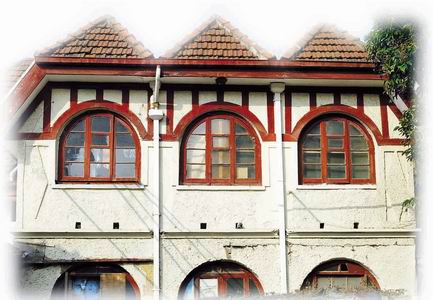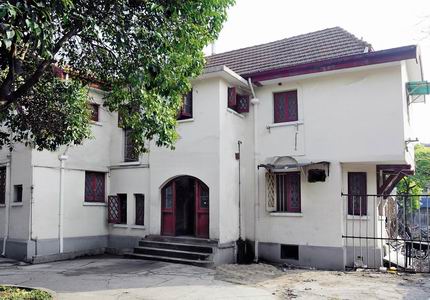Shanghai Daily news


The villa at 45 Taojiang Road is one of the three former
Shanghai residences of Soong Ching Ling, the late honorary chairperson of
the People¡¯s Republic of China and the widow of Dr Sun Yat-sen.
Thick, greasy dirt stains the walls of the once lovely but now tattered villa
at 45 Taojiang Road. It's hard to believe this was once the Shanghai home of
graceful Soong Ching Ling, the former honorary chairperson of the People's
Republic of China and the widow of Dr Sun Yat-sen. Today, local residents are
trying to prevent it from falling into the hands of property developers and
becoming another ``old house'' lost to the city forever.
The empty villa is
hidden behind a red, iron gate on Taojiang Road and it's easy for passers-by to
miss. Camphor-laurel trees, untrimmed lawns and several ugly, illegally built
kitchens are in the desolate, small garden. The air in the garden is scented
with the appetizing, spicy aromas of food cooking in a neighboring Sichuan
restaurant.
Well, it does require a bit of imagination to see past the dust,
rubbish and smells to imagine what the villa once looked like when it was the
residence of one of the three famous Soong sisters.
Its red tiles match the
tiny red, wooden windows set in the stained creamy outer walls. The house has
impressive wooden doors in green and mustard-yellow hues, the staircase rails
are like mooring ropes and the grounds are paved with red and black ceramic
tiles.
It's a small villa but it was big enough for Soong Ching Ling. In
1945, when she moved in, she had been working alone for 20 years to continue her
husband's revolutionary work. Dr Sun had died of liver cancer in 1925 and they
had no children of their own.
``After World War II, the Kuomintang
government confiscated the house which had been built originally by a German
merchant,'' says Wang Zhixian, an officer of the Shanghai Dr Sun Yat-sen and
Soong Ching Ling Relics Management Committee. ``When Soong returned to Shanghai
from Chongqing after World War II, she found her house on Xiangshan Road, where
she'd lived with Dr Sun, abandoned and damaged. Even the water pipes in the
house had been stolen. So, the government assigned her this smaller house on
Taojiang Road as her residence.''
Yang Xiaofo, the son of one of Dr Sun's
former secretaries, Yang Xingfo, has often visited the house. In 1933, when he
was a little boy, Yang -- now 87 -- saw his father assassinated. Young Yang was
wounded during the assassination and was later cared for by Soong.
``The
house is similar in structure to her Xiangshan Road home but smaller,'' Yang
says. ``The former German owner had left some things behind and Soong Ching Ling
also had a set of charcoal-hued furniture and a cane chair which had been sent
over by her mother. The sitting room, dining room and kitchen were on the first
floor and she lived on the second.''
Soong returned to the house on
Xiangshan Road in late 1947 and in the spring of 1949, her brother-in-law, the
former Kuomintang leader Chiang Kai-shek, directed that she be allowed to live
in the white villa, shaped like a ship, at 1843 Huaihai Road M. She resided
there until she moved to Beijing in 1963. After Soong died in 1981, the Huaihai
Road residence became a museum commemorating her life. Her Xiangshan Road home
had been turned into a museum for Dr Sun in the 1950s and the Taojiang Road
residence had become living quarters for staff working at the Shanghai
Conservatory of Music. Its connection with Soong Ching Ling was gradually
forgotten -- until recently.
``We have found that people have been paying
money to have families moved out of the house and we fear that there are plans
to turn it into a restaurant,'' says Wang. ``But they cannot destroy it. Madame
Soong may have lived here for only two years but her work while she lived in the
house was tremendous. It was there that she established the China Welfare
Institute to help Chinese children who had suffered in the war and where she
arranged medical support to be sent to the liberated areas in the country.''
In October last year, the Dr Sun Yat-sen and Soong Ching Ling Relics
Management Committee wrote to the Xuhui District Cultural Bureau asking that the
villa be preserved.
``We paid attention to the letter and we are applying
for the house to be declared a `historical preserved building in Xuhui
District','' says Song Haojie, deputy director of the bureau. ``We want to
renovate it into a mini-museum but we are still awaiting approval from the
district government.''
Soong's life and destiny were closely tied to that of
her hometown. She was born in Shanghai on January 27, 1893 and grew up in the
Soong family home on Shaanxi Road. She lived in the city for most of her life
and is buried in the family mausoleum in Hongqiao.
She succeeded her elder
sister, Soong Ai Ling, as Dr Sun's secretary and she married him in 1915 over
the strong objections of her parents.
Soong's life in Shanghai had many ups
and downs. In her later years in Shanghai she had no husband, no childhood
friends, her parents were both dead and her sisters were far removed from her,
both geographically and politically. Her younger sister, Soong Mei Ling, fled to
Taiwan with Chiang Kai-shek after Liberation in 1949 and she never returned to
China, not even to attend Soong Ching Ling's funeral in 1981. Her elder sister,
Soong Ai Ling, had died in the United States.
Soong Ching Ling's main
companion was a loyal maid named Li Yan'e, whose tomb is the exact size and
style as Soong Ching Ling's.
She might have been thought in her later years
to have been the loneliest woman in Shanghai but this was far from the truth.
``She had many friends, especially foreign friends, and she took part in lots of
social activities,'' says Yang. ``But she didn't like seeing two different
friends at the same time. So, if I wanted to dine at her home, I had to call
beforehand. ``Her chef cooked Cantonese and Western food, which were her
favorites. The chef also made delicious French cream cakes. Soong Ching Ling
spoke Shanghai dialect with me and Cantonese dialect with her chef and
maid.''
Yang says that when he was a boy Soong never treated him as a child
but always as an adult. ``She used to take me to the Cathay Theater to watch
foreign movies and to my father's tomb to pay homage. She would discuss novels
and films with me over lunch. She was a beautiful, kind, easy-going and humorous
woman,'' he says. "She always appeared calm, but she was actually very
passionate."
This beloved beauty and heroine of China has been gone for more
than 20 years but she has bequeathed much to her country and to Shanghai -- such
as the now run-down home on Taojiang Road.



